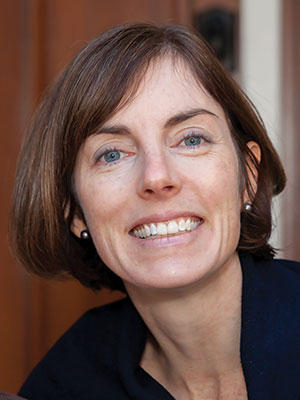A good friend has asked me to accompany her to an appointment with her cancer doctor. What do I need to know before I go?

Hadley Maya, Clinical Social Worker at Memorial Sloan Kettering Cancer Center in New York City. Photo courtesy of Hadley Maya
HADLEY MAYA: Chances are that your friend has asked you to come along primarily to serve as an extra set of ears and for emotional support. However, you might also play various practical roles, depending on the nature of the appointment and the needs of your friend.
The first thing I’d recommend is to maintain a curious outlook. That means taking time to ask your friend questions. Clarify what kind of appointment you’re attending so you have a better idea of what to expect. If your friend primarily wants you there to listen in, ask her if it would be helpful for you to write things down during the appointment. Perhaps she would also like help preparing a list of questions for the doctor ahead of time. Plan to take a notebook and pen or pencil along, especially if the appointment will be information-heavy.
Rather than asking your friend open-ended questions, it often helps to be more specific about what you might be able to do for her. However, remember to stay open to whatever it is she might have to say about her experience and needs.
If her appointment will include chemotherapy treatment, which can last a few hours, it’s likely your friend wants you there as an emotional support and a source of distraction. In that case, ask your friend if there’s anything she needs or wants you to bring along, such as snacks, drinks, crossword puzzles, or perhaps a download of her favorite TV show.
Most likely your friend won’t expect you to be an expert about her particular cancer. Her request for you to be there likely has more to do with your presence. Give her space to talk, but let her know you’re there whether she feels like talking or not. Keep yourself open to your friend’s cues, and be ready to adapt to whatever it is she needs from you in that moment.
If you don’t have experience in a clinical setting, keep in mind that you might see things that you aren’t used to seeing. Depending on your own history and feelings about illness and cancer, it might be upsetting or scary for you. Make sure you’ll have the support you need before and after that visit.
SUPPORTING A FRIEND // Cancer.Net provides a list of ways you can support a friend with cancer. // UVA Cancer Center offers advice on what to pack for a friend’s chemotherapy appointment. // Memorial Sloan Kettering Cancer Center has general tips on how to get the most out of an oncologist appointment.
My doctor has told me that I have no evidence of disease. What questions should I ask?

Otis Brawley, Former Chief Medical and Scientific Officer and Executive Vice President of the American Cancer Society in Atlanta. Photo courtesy of the American Cancer Society
OTIS BRAWLEY: The first question to ask your doctor is: Based on what’s known about your cancer—including cancer type and the genetics of your cancer, if you have that information—what is the probability that there will be a relapse?
Having established the likelihood of a relapse, the next question to consider is: What is the regimen of surveillance that should be undertaken to catch a relapse if one occurs? The recommended surveillance regimen will vary depending on the particular disease you’ve had. Your doctors may recommend a CT scan every three to six months, or a blood test and a chest X-ray, or something else.
When it comes to breast cancer, for example, doctors are highly attuned to relapses in the breast. That’s because these relapses can often be treated, and patients tend to do very well. On the other hand, doctors are less attentive toward relapses in other parts of the body after a breast cancer diagnosis, such as in the lung, liver or bone. That’s because in the case of a relapse outside the breast, there’s little evidence that further aggressive treatment will help patients to live longer.
While that’s generally true for cancers in many organ sites, there are exceptions. In lymphoma, doctors will want to catch a metastatic relapse early, because catching and treating metastatic lymphoma early on offers a good chance for prolonged remission.
Finally, ask your doctor what—if anything—you can do to help lower your risk of a relapse. For instance, there’s now evidence that weight gain during or after treatment is associated with an increased risk of relapse. Ideally your doctor will have already talked to you about diet, exercise and other lifestyle factors. If not, now is the time.
AFTER CANCER TREATMENT // CancerCare dispenses advice for survivors who fear the prospect of recurrence. // The Johns Hopkins Kimmel Cancer Center offers tips to reduce risk of cancer recurrence. // The American Cancer Society provides an easy-to-read guide to life after treatment.
I’d like to ensure that any genetic testing I have done can also be used to help others. How do I share this information for research purposes?

Julianne O’Daniel, Director of Genetic Counseling, Program in Cancer and Adult Genetics at the University of North Carolina at Chapel Hill. Photo courtesy of Julianne O’Daniel
JULIANNE O’DANIEL: A person diagnosed with cancer might have different kinds of genetic testing done for different reasons. Genetic testing to evaluate an inherited risk can tell you about genes you’ve inherited that are related to cancer risk. BRCA1 or BRCA2 mutations that cause an increased risk for breast and ovarian cancer are perhaps the most familiar example.
Nowadays, many patients with cancer are also undergoing genetic or genomic testing on the tumor itself. This kind of testing offers a snapshot of the cancer process. At a basic level, cancer is an accumulation of genetic mistakes that cause otherwise normal cells to grow out of control. When tests are performed on the tumor, the goal is to find specific genes that may drive its growth and, when possible, to guide treatment based on that information. This approach is a type of personalized or precision medicine.
The results of inherited risk or tumor tests might be useful to you and your doctors or other members of your family. They may also be of interest to researchers. Sometimes the labs that do the genetic testing are interested in collecting your information for research purposes. Your lab report may include information about how you can participate.
If you are interested in seeking opportunities to participate in genetic research, a good place to start exploring options is a nearby cancer center, if one is available. Representatives there are likely to know about studies being done locally or about researchers or clinicians who may be involved in bigger nationwide studies.
Support and education groups are also good places to explore opportunities. For example, the Pancreatic Cancer Action Network offers an online database enabling patients to share their information so that researchers can look for patterns that will lead to improved treatment options and outcomes for patients. While not specific to cancer, genomeconnect.org offers an online registry for sharing de-identified genetic and health information, with the goal of learning more about genetics and health.
You might also consider sharing a physical sample of your tumor, blood or other tissue in a registry. Many cancer centers collect samples for use in a number of different research studies. Often, you won’t know how your sample will be used—or even if it will be used at all. It is important to make sure you’re comfortable with the possibility that you may or may not hear anything back.
If you are interested in sharing your genetic information for research purposes, there are many ways to do so. Just don’t forget that depending on the nature of your test results, the most important people to share those results with may be members of your own family.
GENETIC TESTING // The National Society of Genetic Counselors hosts a searchable database of genetic counselors. // The National Cancer Institute provides information on how to donate blood, tissue and other samples. // My Cancer Genome offers descriptions of different types of molecular and genetic tumor testing.
Cancer Today magazine is free to cancer patients, survivors and caregivers who live in the U.S. Subscribe here to receive four issues per year.




